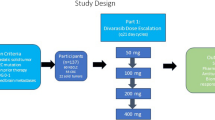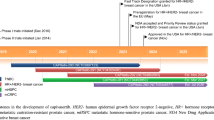Abstract
Background
More than half of colorectal tumors harbor activating mutations in RAS/RAF proteins. Selumetinib (AZD6244, ARRY-142886) is a small molecule kinase inhibitor targeting MEK kinase, downstream of RAS. We examined the efficacy and safety of selumetinib with irinotecan in second-line therapy.
Methods
Patients with K-RAS mutated colorectal cancer, progressing on first-line oxaliplatin‐based chemotherapy with bevacizumab, were eligible for this multicenter open-label phase I/II trial. In part A, a dose was determined using a standard “3 + 3” design; in part B, efficacy was determined. The primary endpoint was RECIST response rate. Historical data for irinotecan were used as reference. Secondary endpoints included progression-free survival and overall survival.
Results
Thirty-two patients entered the study, and 31 were treated. All had K-RAS exon 2 mutated tumors. In phase I, the recommended oral dose of selumetinib was 75 mg twice per day with intravenous (IV) irinotecan, 180 mg/m2 every 2 weeks. Three patients (9.7 %) had partial response . Sixteen patients (51.6 %) had stable disease for ≥4 weeks, including three >1 year. The most common grade 3 adverse events included diarrhea, neutropenia, fatigue, anemia, nausea, and dehydration. The study was terminated before a pre-planned accrual of 45 subjects.
Conclusions
Despite termination before full accrual, the point estimates of RR and median PFS show promising results, suggesting that further investigations of MEK inhibition in the treatment of metastatic colorectal cancer are warranted. Studies combining MEK inhibitors with cytotoxics or other targeted agents may lead to improved clinical activity based on the emerging preclinical data.

Similar content being viewed by others
References
Siegel R, Naishadham D, Jemal A (2013) Cancer statistics, 2013. CA Cancer J Clin 63:11–30
Muratore A, Zorzi D, Bouzari H et al (2007) Asymptomatic colorectal cancer with un-resectable liver metastases: immediate colorectal resection or up-front systemic chemotherapy? Ann Surg Oncol 14:766–770
Kopetz S, Chang GJ, Overman MJ et al (2009) Improved survival in metastatic colorectal cancer is associated with adoption of hepatic resection and improved chemotherapy. J Clin Oncol 27:3677–3683
Renouf DJ, Lim HJ, Speers C et al (2011) Survival for metastatic colorectal cancer in the bevacizumab era: a population-based analysis. Clin Colorectal Cancer 10:97–101
Karapetis CS, Khambata-Ford S, Jonker DJ et al (2008) K-ras mutations and benefit from cetuximab in advanced colorectal cancer. N Engl J Med 359:1757–1765
Kalady MF, Dejulius KL, Sanchez JA et al (2012) BRAF mutations in colorectal cancer are associated with distinct clinical characteristics and worse prognosis. Dis Colon Rectum 55:128–133
Van Cutsem E, Kohne CH, Lang I et al (2011) Cetuximab plus irinotecan, fluorouracil, and leucovorin as first-line treatment for metastatic colorectal cancer: updated analysis of overall survival according to tumor KRAS and BRAF mutation status. J Clin Oncol 29:2011–2019
Di Nicolantonio F, Martini M, Molinari F et al (2008) Wild-type BRAF is required for response to panitumumab or cetuximab in metastatic colorectal cancer. J Clin Oncol 26:5705–5712
Tournigand C, Andre T, Achille E et al (2004) FOLFIRI followed by FOLFOX6 or the reverse sequence in advanced colorectal cancer: a randomized GERCOR study. J Clin Oncol 22:229–237
Rajalingam K, Schreck R, Rapp UR et al (2007) Ras oncogenes and their downstream targets. Biochim Biophys Acta 1773:1177–1195
Roberts PJ, Der CJ (2007) Targeting the Raf-MEK-ERK mitogen-activated protein kinase cascade for the treatment of cancer. Oncogene 26:3291–3310
Migliardi G, Sassi F, Torti D et al (2012) Inhibition of MEK and PI3 K/mTOR suppresses tumor growth but does not cause tumor regression in patient-derived xenografts of RAS-mutant colorectal carcinomas. Clin Cancer Res 18:2515–2525
Davies BR, Logie A, McKay JS et al (2007) AZD6244 (ARRY-142886), a potent inhibitor of mitogen-activated protein kinase/extracellular signal-regulated kinase kinase 1/2 kinases: mechanism of action in vivo, pharmacokinetic/pharmacodynamic relationship, and potential for combination in preclinical models. Mol Cancer Ther 6:2209–2219
Adjei AA, Cohen RB, Franklin W et al (2008) Phase I pharmacokinetic and pharmacodynamic study of the oral, small-molecule mitogen-activated protein kinase kinase 1/2 inhibitor AZD6244 (ARRY-142886) in patients with advanced cancers. J Clin Oncol 26:2139–2146
Banerji U, Camidge DR, Verheul HM et al (2010) The first-in-human study of the hydrogen sulfate (Hyd-sulfate) capsule of the MEK1/2 inhibitor AZD6244 (ARRY-142886): a phase I open-label multicenter trial in patients with advanced cancer. Clin Cancer Res 16:1613–1623
Bennouna J, Lang I, Valladares-Ayerbes M et al (2011) A Phase II, open-label, randomised study to assess the efficacy and safety of the MEK1/2 inhibitor AZD6244 (ARRY-142886) versus capecitabine monotherapy in patients with colorectal cancer who have failed one or two prior chemotherapeutic regimens. Invest New Drugs 29:1021–1028
Eisenhauer EA, Therasse P, Bogaerts J et al (2009) New response evaluation criteria in solid tumours: revised RECIST guideline (version 1.1). Eur J Cancer 45:228–247
Kim K, Infante J, Cohen R et al (2011) A phase I dose-escalation study of selumetinib in combination with docetaxel in patients with advanced solid tumors. Mol Cancer Ther 10:Abstract B225
Janne PA, Shaw AT, Pereira JR et al (2013) Selumetinib plus docetaxel for KRAS-mutant advanced non-small-cell lung cancer: a randomised, multicentre, placebo-controlled, phase 2 study. Lancet Oncol 14:38–47
Sobrero AF, Maurel J, Fehrenbacher L et al (2008) EPIC: phase III trial of cetuximab plus irinotecan after fluoropyrimidine and oxaliplatin failure in patients with metastatic colorectal cancer. J Clin Oncol 26:2311–2319
Simon R (1989) Optimal two-stage designs for phase II clinical trials. Control Clin Trials 10:1–10
Cunningham D, Humblet Y, Siena S et al (2004) Cetuximab monotherapy and cetuximab plus irinotecan in irinotecan-refractory metastatic colorectal cancer. N Engl J Med 351:337–345
Trujillo JI (2011) MEK inhibitors: a patent review 2008–2010. Expert Opin Ther Pat 21:1045–1069
Flaherty KT, Robert C, Hersey P et al (2012) Improved survival with MEK inhibition in BRAF-mutated melanoma. N Engl J Med 367:107–114
Britten CD (2013) PI3K and MEK inhibitor combinations: examining the evidence in selected tumor types. Cancer Chemother Pharmacol 71:1395–1409
Spreafico A, Tentler JJ, Pitts TM et al (2013) Rational combination of a MEK inhibitor, selumetinib, and the Wnt/calcium pathway modulator, cyclosporin A, in preclinical models of colorectal cancer. Clin Cancer Res 19:4149–4162
Morelli MP, Tentler JJ, Kulikowski GN et al (2012) Preclinical activity of the rational combination of selumetinib (AZD6244) in combination with vorinostat in KRAS-mutant colorectal cancer models. Clin Cancer Res 18:1051–1062
Balmanno K, Chell SD, Gillings AS et al (2009) Intrinsic resistance to the MEK1/2 inhibitor AZD6244 (ARRY-142886) is associated with weak ERK1/2 signalling and/or strong PI3 K signalling in colorectal cancer cell lines. Int J Cancer 125:2332–2341
Acknowledgments
This study was supported in part by a Grant from Astra-Zeneca pharmaceuticals.
Conflict of interest
Dr. Hochster has a consultant or advisory role for Astra-Zeneca, with no relationship to study outcome. All remaining authors have declared no conflicts of interest.
Author information
Authors and Affiliations
Corresponding author
Additional information
For the Academic GI Cancer Consortium (AGICC).
Rights and permissions
About this article
Cite this article
Hochster, H.S., Uboha, N., Messersmith, W. et al. Phase II study of selumetinib (AZD6244, ARRY-142886) plus irinotecan as second-line therapy in patients with K-RAS mutated colorectal cancer. Cancer Chemother Pharmacol 75, 17–23 (2015). https://doi.org/10.1007/s00280-014-2609-3
Received:
Accepted:
Published:
Issue Date:
DOI: https://doi.org/10.1007/s00280-014-2609-3




